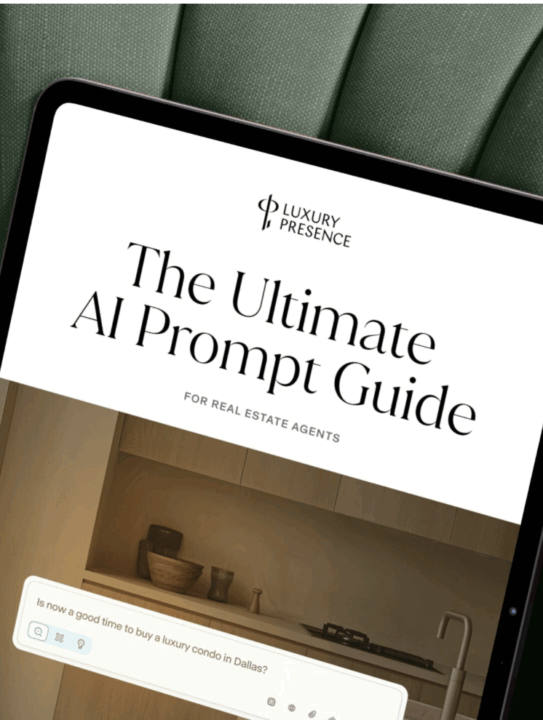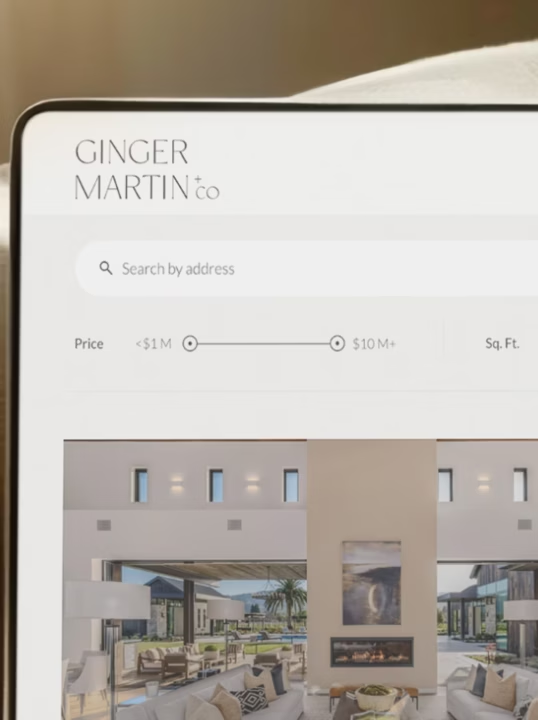
Excelling in the era of AI-first search: SEO insights from Kyle Whigham at Luxury Presence
The world of digital marketing is entering a new era, shaped not just by algorithms but by artificial intelligence. With the rise of Google’s AI Overviews, ChatGPT, Perplexity, and Microsoft’s Copilot, how people find and evaluate information online is changing fast.
Instead of scanning through links on a search results page, today’s buyers and sellers often get direct answers from AI, without ever visiting a website.
This shift has significant implications for luxury real estate agents. The tactics that once secured top Google rankings may no longer guarantee visibility or traffic. But new opportunities are opening up for agents who adapt early — those who understand how AI tools work, what content they prioritize, and how to position themselves as credible, go-to experts.
In this post, we’ll break down what’s changing in search, why it matters for your brand, and how Luxury Presence is helping agents stay ahead so you’re not just found, but featured.
Find It Fast
The search landscape is shifting
For two decades, search engines like Google and Bing ruled organic traffic with the classic “10 blue links.” Pages earned their spot by matching a user’s keywords. That changed in May 2024, when Google launched AI Overviews — its boldest update since featured snippets.
Fast forward to today, and how users across the country are searching has changed dramatically. Google announced AI Mode, ChatGPT has prominently featured SearchGPT, Perplexity is a literal AI search engine, and Bing has integrated Microsoft Copilot into its search results.
Instead of simply presenting links, these platforms deliver complete answers. They pull from content across the web, summarize it, and show the result directly, often above any organic listings. Your site might provide an answer … but miss out on earning their traffic.
How this impacts real estate agents
This shift in search has profound implications for real estate agents. As your target audience skews younger and more technically fluent, they are much more likely to be early adopters of emerging technology, like AI-driven search. Buyers and sellers will be increasingly more likely to turn to AI-powered platforms to answer questions like:
- “What are the best neighborhoods in Austin for luxury living?”
- “How much can I afford if I sell in Beverly Hills and buy in Malibu?”
- “What’s the market like for waterfront homes in Naples, Florida?”
Instead of showing a list of links, AI tools summarize responses, highlighting content they see as trustworthy, topical, and written by experts.
What this means for visibility
This AI-first shift doesn’t mean that “SEO is dead,” contrary to what SEO influencers on LinkedIn may have you believe. Instead, it means visibility is changing. The goal is no longer to appear on the first page of Google. Now it’s to be quoted, cited, and/or summarized by AIs and LLMs.
Let’s look at what search could look like in this new frontier:
- A neighborhood guide that was optimized for SEO might now be used to power a Perplexity.ai answer
- A blog post on market trends could be summarized in Google’s AI Overviews, and may or may not receive attribution unless your content stands out
- Your brand could be mentioned by name in ChatGPT, but you won’t see that traffic in Google Analytics unless the user clicks through
The platforms and how results are presented are ever evolving. But one thing hasn’t changed: Buyers and sellers still want trustworthy, local expertise.
The agents who show up in AI Answers tomorrow will build brand demand, content, and topical authority today.
The Ultimate
AI Prompt Guide
The shortcut to AI mastery starts here.

What we know — and don’t know — about AI-first search
AI-driven search is still in its infancy, but patterns are starting to emerge. By analyzing how platforms like Google, ChatGPT, and Perplexity surface content in their answers, we can start to grasp how these platforms “choose” which brands and websites to reference, and what it means for your online presence.
What we know
- Authority and trust are non-negotiable.
AI tools elevate content that feels credible. For agents, that means showcasing your unique, hyperlocal insights, proven experience, and a clear personal or brand identity across multiple online platforms. - Structured content gets noticed.
Content that’s organized, easy to read, and uses elements like FAQs or how-tos (via Schema markup) tends to get cited. AI favors clarity, so formatting best practices matter. - Local relevance wins.
Genuinely helpful content, written from an expert’s perspective, particularly when it offers something unique about a specific city or niche, tends to stand out. Hyperlocal content — neighborhood guides, market snapshots, and community blogs — often performs best. The more specific, the better. - It’s time to think beyond keywords.
Google’s AI Mode breaks queries into sub-questions based on user intent. Your content should aim to cover the full journey, not just hit a keyword. Content strategies must evolve to focus on topical expertise and depth. - A decline in traffic may be imminent, but quality is on the rise.
AI often answers the question upfront, which could mean fewer clicks. But those who do click are often ready to act.
What we still don’t know
- What’s the best metric for AI/LLM success?
Measuring LLM-driven visibility — like Google’s AI Overviews (AIO) — is still messy. While Google Search Console now includes AIO traffic, there’s no way to filter it, making the data noisy and hard to trust. Attribution is inconsistent: LLMs may cite your brand without driving clicks, creating visibility without clear ROI. Traditional tools don’t account for this, so we’re monitoring closely and exploring new ways to track impact beyond impressions and traffic. - Will tried-and-true SEO tactics produce results in AI and LLM answers?
We genuinely believe that if you’ve been following SEO best practices, cultivated a strong online brand presence, and showcased your respective local/niche expertise, you should see success in LLM answers. However, we are actively experimenting with which strategies, types of content, and how online mentions can drive success in LLMs. - How will personalization impact what your clients see?
We know that LLMs can generate different answers for different users based on query phrasing, location, and personal chat history. Google’s AI Mode takes this a step further by further personalizing results based on a user’s past searches, location, device, habits, etc. This means that an AI answer shown to a buyer in New York City very well may differ from a buyer in Palm Beach, even for the same question. This makes it harder to control or reasonably predict your visibility in LLMs. - Evergreen or fresh content: which will win out with LLMs?
Historically, evergreen content performs well in SEO. But AI might prioritize freshness, especially for market data. We’re betting on keeping content regularly updated. - Will LLMs favor large brands or reward niche expertise?
There’s speculation that LLMs will heavily favor large publishers and established domains (think Zillow, Redfin, Forbes, etc.). If this trend continues, smaller brokerages or individual agents risk becoming deprioritized unless they carve out clear authority in a local niche.
To summarize, while we can’t predict every move AI platforms will make, we do know this:
Agents who build real, helpful, expert-level content and cultivate a strong online brand presence, setting themselves apart from their local competition, are positioned for long-term visibility across traditional and AI-powered search experiences.
How Luxury Presence is staying ahead of the curve
At Luxury Presence, we’re not just tracking the future of search. We’re helping shape it. As AI reshapes how people discover agents, our strategies are built to meet them wherever they’re searching.
Tactics built for AI (not just Google)
- Optimize for answers, not keywords.
We structure content around real questions your clients ask — guides, how-tos, market updates — using clear formatting and schema markup to help AI find and cite it.
- Track visibility across LLMs.
We’re testing new tools to detect mentions in ChatGPT, Perplexity, and other AI platforms so we can see what’s working.
- Build trust through real-world expertise.
AI rewards authenticity. We highlight your personal insights, local knowledge, and clear brand voice — because you’re not just a name on a site. You’re the expert in your market.
Data-informed strategy, not guesswork
Because the search landscape is continuing to unfold, we rely on real-time data signals, not just theory. Our team regularly reviews:
- Traffic from LLMs like ChatGPT, Perplexity, and Bing Chat
- Pages that appear in Google AI Overviews
- Search visibility patterns before and after AI Platform updates
- Which content types perform the best and are cited more frequently in LLMs
The data we collect informs everything from the topics we suggest for blogs to how we structure landing pages for maximum AI readability and human engagement.
We’re staying flexible so our clients stay visible
If there’s one takeaway from this new era of search, it’s that what works today might not work tomorrow. That’s why our SEO plans are built to pivot quickly, be it adjusting content strategies based on AI behavior or updating the Presence(™) platform to be more accessible to LLM crawlers.
As AI platforms continue to evolve, we’re committed to keeping our clients ahead of the competition by helping shape how real estate agents can own the future of search.
Looking ahead: Visibility in the age of AI
AI-first search isn’t a trend. It’s the future. And the agents who adapt early will be leading tomorrow’s conversations.
At Luxury Presence, we’re committed to helping you own that future. If you’re ready to understand how your brand is (or isn’t yet) prepared for the future of search, schedule a demo today. We’ll help you stay visible, clickable, and unforgettable no matter how the search landscape evolves.
Get the platform that drives results.
Agents using Luxury Presence grew sales nearly 2x faster than their peers, increased sold listings by 6%, and closed over $300B in transactions. Ready to grow your business? Let us show you how.




